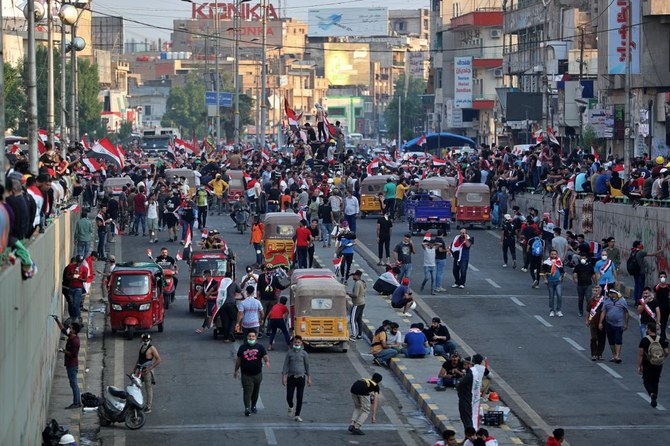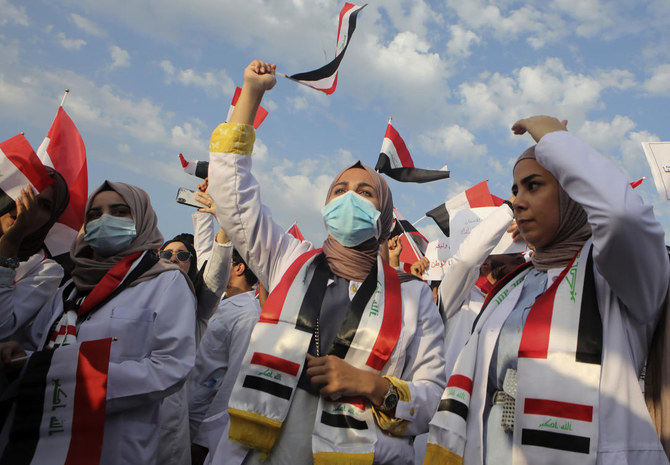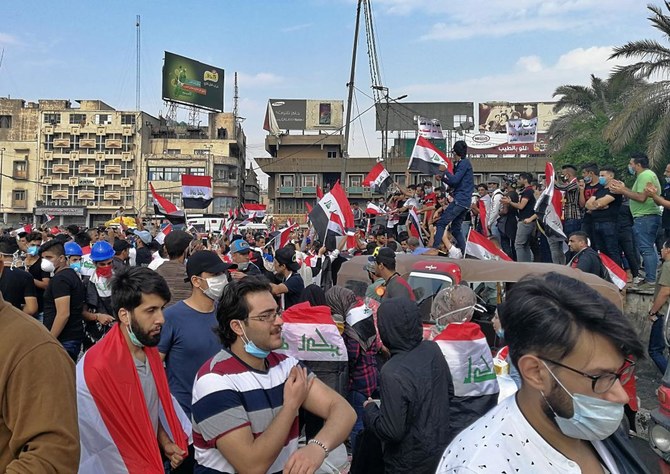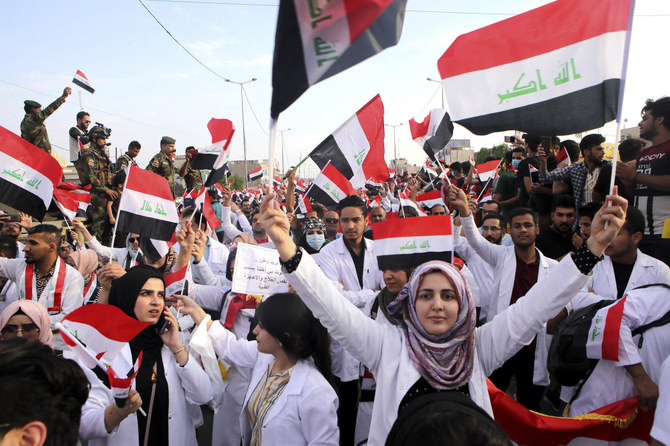BAGHDAD: Iraq’s most powerful politicians appeared to withhold support for Prime Minister Adel Abdul Mahdi on Wednesday, as anti-government protests swelled into the biggest mass demonstrations the country has seen since the fall of Saddam Hussein.
Protesters from across Iraq’s sectarian and ethnic divides thronged the center of the capital Baghdad in a show of fury at the political class. While Abdul Mahdi’s fate was not yet clear, demonstrators said removing him would not be enough.
After four weeks of protests in which more than 250 people have been killed, the past 24 hours saw the demonstrations swell to a previously unseen scale in the capital.
Middle class families with small children joined self-proclaimed “revolutionary” youths from poor neighborhoods to brave tear gas and barricades in Baghdad’s Tahrir Square.
“No Moqtada, no Hadi,” protesters chanted, denouncing what they saw as an effort by the leaders of parliament’s two largest blocs — populist cleric Moqtada Al-Sadr and militia leader Hadi Al-Amiri — to cling to power behind the scenes with or without the prime minister they installed a year ago.
Sadr has demanded Abdul Mahdi call an early election. When the premier refused, Sadr called on Amiri, his main political rival, to help oust him.
Amiri issued a statement overnight that was initially seen as accepting Sadr’s call to ditch Abdul Mahdi. But a day of silence followed, leaving the prime minister’s fate in limbo.
“We will work together to secure the interests of the Iraqi people and save the nation in accordance with the public good,” Amiri had said in the overnight statement.
Many young women and older people joined the protests as they gained momentum and appeared safer. The mood was jubilant yet defiant, with many singing and dancing and a group of young men even playing dominos, in contrast with the tense situation earlier this week when scores were killed nationwide.
One wheelchair-bound man said he came with his two young granddaughters to support the protesters.
The protesters have drawn inspiration from a similar uprising in Lebanon, where pan-sectarian anti-government protests forced Prime Minister Saad Harari to step down.
“We are staying and holding our ground. Our demand is not only to replace Adel Abdul Mahdi: we want the whole government uprooted,” said Karar Saad, 20. “All of them are thieves.”
Despite promising reforms and ordering a broad reshuffle of the cabinet, Abdul Mahdi has done little to address the demonstrators’ complaints. Parliament passed measures on Monday including reduced salaries for officials, but protesters derided this as too little too late.
The security forces responded to the initial unrest in early October with a brutal crackdown, firing with live ammunition from rooftops into crowds. But if they hoped to intimidate the demonstrators, the tactic has backfired, inflaming passions.
Despite OPEC member Iraq’s vast oil wealth, many Iraqis live in poverty or have limited access to clean water, electricity, basic health care and education. Most of the protesters are young people who above all want jobs.
While the demonstrations were initially mostly made up of young men, they have become more diverse as the crowds have swelled, with more families, women and older people braving streets strewn with tear gas canisters and debris.
“We are a people who love life, we are a country of riches that you steal. We are staying here, women and men, we will not retreat!” said Safaa, a female student. “Leave! Enough! You haven’t had enough stealing?“
She called for dismantling the entire system of power sharing among sectarian political parties, put in place after the 2003 US-led invasion that toppled Saddam.
The entrance to Tahrir Square was littered with makeshift tents on Wednesday with many protesters camping out there overnight. Young men formed human chains to keep roads clear for a flurry of tuk-tuks, which have been used to ferry the wounded through crowds from the battle lines of clashes with police.
Security forces continued to lob tear gas at protesters on a nearby bridge who sought to break into the heavily fortified Green Zone which houses government buildings. There appeared to be less tear gas than on previous days. At least 26 people were injured, medical sources said.
Protests took place in five other provinces, mostly in the southern Shiite heartland. Around 800 people gathered in the Shiite holy city of Najaf, 500 in Diwaniya, and over 1,500 in Nassiriya, where at least 51 people were wounded overnight when security forces opened fire to disperse protests.
Over 2,000 people gathered in oil-rich Basra, where operations came to a complete standstill at the Umm Qasr commodities port after protesters blocked its entrance in the previous day, port officials said.
Iraq prime minister’s fate in limbo as crowds of demonstrators swell
Iraq prime minister’s fate in limbo as crowds of demonstrators swell

- Sadr has demanded Abdul Mahdi call an early election
- When the premier refused, Sadr called on Amiri, his main political rival, to help oust him
UN chief condemns ‘escalation’ between Yemen’s Houthis and Israel

- UN Secretary-General Antonio Guterres calls Israeli strikes on Sanaa airport ‘especially alarming’
NEW YORK: The UN chief on Thursday denounced the “escalation” in hostilities between Yemen’s Houthi militias and Israel, terming strikes on the Sanaa airport “especially alarming.”
“The Secretary-General condemns the escalation between Yemen and Israel. Israeli airstrikes today on Sana’a International Airport, the Red Sea ports and power stations in Yemen are especially alarming,” said a spokesperson for UN Secretary-General Antonio Guterres in a statement.
Israeli air strikes pummeled Sanaa’s international airport and other targets in Yemen on Thursday, with Houthi militia media reporting six deaths.
The attack came a day after the Houthis fired a missile and two drones at Israel.
World Health Organization chief Tedros Adhanom Ghebreyesus said on social media he was at the airport during the strike, with the UN saying that a member of its air crew was injured.
The United Nations put the death toll from the airport strikes at three, with “dozens more injured.”
UN chief Guterres expressed particular alarm at the threat that bombing transportation infrastructure posed to humanitarian aid operations in Yemen, where 80 percent of the population is dependent on aid.
“The Secretary-General remains deeply concerned about the risk of further escalation in the region and reiterates his call for all parties concerned to cease all military actions and exercise utmost restraint,” he said.
“He also warns that airstrikes on Red Sea ports and Sana’a airport pose grave risks to humanitarian operations at a time when millions of people are in need of life-saving assistance.”
The UN chief condemned the Houthi militias for “a year of escalatory actions... in the Red Sea and the region that threaten civilians, regional stability and freedom of maritime navigation.”
The Houthis are part of Iran’s “axis of resistance” alliance against Israel.
Bodies of about 100 Kurdish women, children found in Iraq mass grave

TAL AL-SHAIKHIA, Iraq: Iraqi authorities are working to exhume the remains of around 100 Kurdish women and children thought to have been killed in the 1980s under former Iraqi ruler Saddam Hussein, three officials said.
The grave was discovered in Tal Al-Shaikhia in the Muthanna province in southern Iraq, about 15-20 kilometers (10-12 miles) from the main road there, an AFP journalist said.
Specialized teams began exhuming the grave earlier this month after it was initially discovered in 2019, said Diaa Karim, the head of the Iraqi authority for mass graves, adding that it is the second such grave to be uncovered at the site.
“After removing the first layer of soil and the remains appearing clearly, it was discovered that they all belonged to women and children dressed in Kurdish springtime clothes,” Karim told AFP on Wednesday.
He added that they likely came from Kalar in the northern Sulaimaniyah province, part of what is now Iraq’s autonomous Kurdistan region, estimating that there were “no less than 100” people buried in the grave.
Efforts to exhume all the bodies are ongoing, he said, adding that the numbers could change.
Following Iraq’s deadly war with Iran in the 1980s, Saddam’s government carried out the ruthless “Anfal Operation” between 1987 and 1988 in which it is thought to have killed around 180,000 Kurds.
Saddam was toppled in 2003 following a US-led invasion of Iraq and was hanged three years later, putting an end to Iraqi proceedings against him on charges of genocide over the Anfal campaign.
Karim said a large number of the victims found in the grave “were executed here with live shots to the head fired at short range.”
He suggested some of them may have been “buried alive” as there was no evidence of bullets in their remains.
Ahmed Qusai, the head of the excavation team for mass graves in Iraq, meanwhile pointed to “difficulties we are facing at this grave because the remains have become entangled as some of the mothers were holding their infants” when they were killed.
Durgham Kamel, part of the authority for exhuming mass graves, said another mass grave was found at the same time that they began exhuming the one at Tal Al-Shaikhia.
He said the burial site was located near the notorious Nugrat Al-Salman prison where Saddam’s authorities held dissidents.
The Iraqi government estimates that about 1.3 million people disappeared between 1980 and 1990 as a result of atrocities and other rights violations committed under Saddam.
Brother of suspected ‘terrorist’ stabs Tunisia National Guard officer

TUNIS: The brother of a suspected “terrorist” on Thursday stabbed a Tunisian National Guard officer in the eastern Monastir governorate, a judicial source told AFP.
Earlier in the day, a National Guard unit attempted to arrest the suspect — accused by authorities of being a member of a “terrorist group” — at his home, said the source, speaking on condition of anonymity.
During the arrest operation, his brother attacked the officer, the source added.
The source said the officer was hospitalized following the stabbing in his abdomen and was recovering after undergoing surgery.
An investigation was opened by the judicial division combatting terrorism, the source added.
Neither of the brothers, both of whom were taken into police custody, have been named, and the Tunisian interior ministry did not respond to AFP’s request for comment.
Tunisia saw a surge in jihadist groups after the 2011 revolution that overthrew the dictatorship of Zine El Abidine Ben Ali.
Attacks claimed by jihadists in recent years have killed dozens of soldiers and police officers, as well as some civilians and foreign tourists.
Jihadist attacks in Sousse and the capital Tunis in 2015 killed dozens of tourists and police, but authorities say they have since made significant progress against extremism.
Palestinian hospital director says Israeli strike kills 5 staff in Gaza

- WHO has described conditions at Kamal Adwan hospital as “appalling” and said it was operating at a “minimum” level
GAZA STRIP: Five staff at one of northern Gaza’s last functioning hospitals were killed by an Israeli strike on Thursday, the facility’s director said, more than two months into an Israeli operation in the area.
Hossam Abu Safiya, head of the Kamal Adwan hospital in Beit Lahia, said “an Israeli strike resulted in five martyrs among the hospital staff.” The Israeli military did not immediately respond to a request for comment.
Israel has been pressing a major offensive in northern Gaza since October 6, saying it aims to prevent Hamas militants from regrouping.
At the other end of the Palestinian territory, the chief paediatric doctor at the Nasser Hospital in Khan Yunis said three babies had died from a “severe temperature drop” this week as winter cold sets in.
Doctor Ahmed Al-Farra said the most recent case was a three-week-old girl who was “brought to the emergency room with a severe temperature drop, which led to her death.”
A three-day-old baby and another “less than a month old” died on Tuesday, he said.
Meanwhile, in central Gaza, a Palestinian TV channel affiliated with a militant group said five of its journalists were killed on Thursday in an Israeli strike on their vehicle in Gaza, with Israel’s military saying it had targeted a “terrorist cell.”
Witnesses said a missile struck the van while it was parked outside Al-Awda Hospital in Nuseirat.
The three-week-old girl, Sila Al-Faseeh, was living in a tent in Al-Mawasi, an area designated a humanitarian safe zone by the Israeli military that is home to huge numbers of displaced Palestinians.
“The tents do not protect from the cold, and it gets very cold at night, with no way to keep warm,” said Farra.
He said many mothers were suffering from malnutrition which affected the quality of their breast milk and compounded the risks to newborns.
Sila’s father Mahmoud Al-Faseeh said it was “extremely cold, and the tent is not suitable for living. The children are always sick.”
The United Nations and other organizations have repeatedly decried the worsening humanitarian conditions in Gaza, particularly in the north, since Israel began its latest military offensive in early October.
The World Health Organization has described conditions at Kamal Adwan hospital as “appalling” and said it was operating at a “minimum” level.
Earlier on Thursday, Gaza’s civil defense agency said that five other people had been killed by Israeli strikes during the day in the north of Gaza.
Meanwhile, the Israeli military said a 35-year-old soldier was killed in the central Gaza Strip. It brings to 390 the number of Israeli soldiers killed since the start of ground operations in the Palestinian territory.
The journalists’ employer Al-Quds Today said in a statement that a missile hit their broadcast van while it was parked in the Nuseirat refugee camp in central Gaza.
The channel is affiliated with Islamic Jihad, whose militants have fought alongside Hamas in the Gaza Strip and took part in the October 7, 2023 attack on Israel that sparked the war.
The station identified the five staffers as Faisal Abu Al-Qumsan, Ayman Al-Jadi, Ibrahim Al-Sheikh Khalil, Fadi Hassouna and Mohammed Al-Ladaa.
They were killed “while performing their journalistic and humanitarian duty,” the statement said.
The Israeli military said it had conducted a “precise strike” and that those killed “were Islamic Jihad operatives posing as journalists.”
The Committee to Protect Journalists’ Middle East arm said in a statement it was “devastated by the reports.”
“Journalists are civilians and must always be protected,” it added.
The Palestinian Journalists Syndicate said last week that more than 190 journalists had been killed and at least 400 injured since the start of the war in Gaza.
The war was triggered by the Hamas-led October 7 attack last year, which resulted in 1,208 deaths, mostly civilians, according to an AFP tally of Israeli official figures.
Israel’s retaliatory military campaign has killed at least 45,399 people in Gaza, a majority of them civilians, according to figures from the Hamas-run territory’s health ministry that the UN considers reliable.
Israeli attorney general orders probe into report that alleged Netanyahu’s wife harassed opponents

- Program uncovered a trove of WhatsApp messages in which Mrs. Netanyahu appears to instruct a former aide to organize protests against political opponents
JERUSALEM: Israel’s attorney general has ordered police to open an investigation into Prime Minister Benjamin Netanyahu’s wife on suspicion of harassing political opponents and witnesses in the Israeli leader’s corruption trial.
The Israeli Justice Ministry made the announcement in a terse message late Thursday, saying the investigation would focus on the findings of a recent report by the “Uvda” investigative program into Sara Netanyahu.
The program uncovered a trove of WhatsApp messages in which Mrs. Netanyahu appears to instruct a former aide to organize protests against political opponents and to intimidate Hadas Klein, a key witness in the trial.
The announcement did not mention Mrs. Netanyahu by name, and the Justice Ministry declined further comment.
But in a video released earlier Thursday, Netanyahu listed what he said were the many kind and charitable acts by his wife and blasted the Uvda report as “lies.”
It was the latest in a long line of legal troubles for the Netanyahus — highlighted by the prime minister's ongoing corruption trial.
Netanyahu is charged with fraud, breach of trust and accepting bribes in a series of cases alleging he exchanged favors with powerful media moguls and wealthy associates. Netanyahu denies the charges and says he is the victim of a “witch hunt” by overzealous prosecutors, police and the media.

























